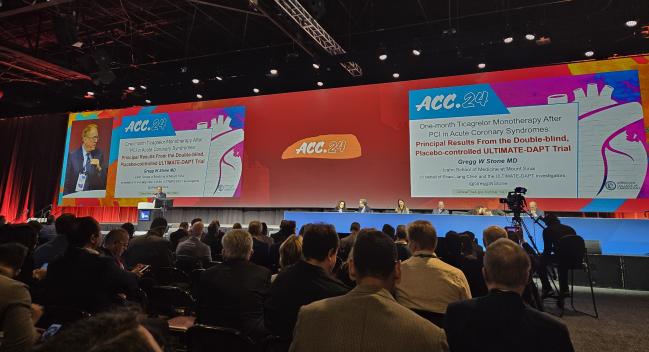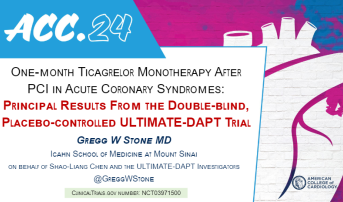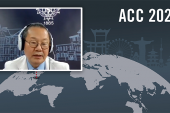ULTIMATE-DAPT: Another Boost for Solo Ticagrelor 1 Month After ACS PCI
(UPDATED) The time to change both practice and guidelines has come, argues Gregg Stone.

ATLANTA, GA—Dropping aspirin and continuing ticagrelor as soon as 1 month after PCI for ACS patients is as effective as continuing dual antiplatelet therapy (DAPT) over a longer period, but also is associated with less clinically-relevant and major bleeding, according to the ULTIMATE-DAPT placebo-controlled trial.
The findings confirm what has been seen in the TICO and TWILIGHT trials, which both discontinued aspirin at 3 months, a post hoc analysis of GLOBAL LEADERS suggesting safety at 1 month, and most recently the T-PASS trial showing the superiority of less than 1 month of DAPT.
“I do believe that this trial in concert with all the prior trials definitely dictate a time for practice change, even before guidelines come out, because the evidence is there from dozens of randomized trials now including this one, arguably the most rigorous,” Gregg W. Stone, MD (Icahn School of Medicine at Mount Sinai, New York, NY), who presented the ULTIMATE-DAPT trial today at the American College of Cardiology 2024 Scientific Session, told TCTMD.
For Usman Baber, MD (University of Oklahoma Health Sciences Center, Oklahoma City), who was not involved in ULTIMATE-DAPT, “the results of this trial, being a double-blind, placebo-controlled design, add more confirmatory evidence around not only the safety but also the efficacy of withdrawing aspirin and continuing ticagrelor now even 1 month after index presentation.”
All of the evidence so far, however, “comes with ticagrelor as a backbone,” Baber highlighted to TCTMD, adding that this should be the “preferred P2Y12 inhibitor of choice” when considering monotherapy after PCI for ACS.
Speaking during the late-breaking session, discussant David Moliterno, MD (University of Kentucky, Lexington), pointed out that these insights are coming after almost two decades of protracted dual therapy in this setting. “We're finally getting to the point where we can shorten” the length of DAPT, he said. “Part of the challenge has been, though, [is that] it's been a moving target, right? We’re changing a lot of things. We've got all kinds of options.”
Less Bleeding, Good Safety
For the study, which was simultaneously published in the Lancet, Zhen Ge, MD (Nanjing First Hospital, China), Stone, and colleagues included 3,400 patients (mean age 62 years; 74% male) from the IVUS-ACS study who underwent PCI with DES and survived event free to 1 month on dual antiplatelet therapy with both ticagrelor and aspirin. They were evenly randomized at that point to continue with ticagrelor plus either aspirin or placebo.
At 12 months, clinically-relevant bleeding (BARC 2, 3, or 5) was reported significantly less often in the group that was on ticagrelor monotherapy compared with those who continued DAPT (2.1% vs 4.6%; HR 0.45; 95% CI 0.30-0.66). Similar findings were observed for major bleeding whether it was defined as BARC 3 or 5; BARC 2; BARC 5; TIMI major; TIMI major or minor; GUSTO moderate, severe, or life-threatening; or ISTH major. There also were no differences observed in subgroup analyses.
There was no difference in major adverse cardiovascular and cerebrovascular events (MACCE), the composite rate of cardiac death, MI, ischemic stroke, definite stent thrombosis, or clinically driven TVR, between the ticagrelor monotherapy and continued DAPT cohorts (3.6% vs 3.7%; HR 0.98; 95% CI 0.69-1.39; P for noninferiority < 0.0001). Additionally, the rate of net adverse clinical events (NACE), defined as MACCE or BARC types 1-5 bleeding, was lower in the ticagrelor monotherapy group (5.7% vs 8.2%; HR 0.68; 95% CI 0.53-0.88).
Notably, Stone said, 88% of the patients in this study were from China, “potentially limiting the generalizability of the results.”
Baber agreed that the generalizability question is valid, in addition to the fact that overall patients in the study were not particularly complex.
“Seventy percent of patients had single vessel-disease, less than 10% had severe calcium or thrombus, and that was reflected in the overall rates of ischemic events, which were actually quite low,” he said. Nevertheless, Baber added, “I would be comfortable [dropping aspirin] in patients that I think fit this profile, which would be a lower thrombotic risk kind of patient population. Probably not [in] all ACS patients.”
Stone said he is comfortable dropping aspirin at 1 month post-PCI in most ACS patients who have tolerated the drug without events up until that point, and that he has already been recommending this to his patients. He would like to see the guidelines change to reflect what the data now support. “Discontinuing aspirin is the appropriate measure and will lead to a substantial reduction in major bleeding and all bleeding with nonischemic rates of MACE,” he said.
I do believe that this trial in concert with all the prior trials definitely dictate a time for practice change. Gregg W. Stone
While they didn’t note any subgroups who might derive harm from this strategy, Stone said he would caution against ticagrelor monotherapy in patients who had events before 1 month, as well as those who “had extremely complex PCI procedures: four-plus stents, complex bifurcation stenting, small-vessel stenting, residual disease. But they are going to be a minority of patients and you'd have to decide that on an individual basis.”
Time for Updated Guidelines
The results of this study, and the rigor with which they were attained, should be “sending a message to guideline committees that it is time perhaps to revisit some of the recommendations that are provided in the most recent updates,” Dominick Angiolillo, MD, PhD (University of Florida College of Medicine, Jacksonville), commented to TCTMD. “Guidelines make higher-level recommendations where there's much less evidence. So, in my opinion, the data is there and the guidelines just need to be a little bit more explicit.”
Baber, too, agreed that it’s time for guidelines to change. A member of the American College of Cardiology/American Heart Association guideline writing committee, he said the updated draft is going through final revisions and expected to come out within the next 6 months.
“Guidelines both in Europe and the US have already adopted P2Y12-inhibitor monotherapy as a strategy,” he said. “I believe future iterations of the guidelines may reinforce that and can certainly consider an earlier time point at which to discontinue aspirin.”
As for future research looking at ticagrelor monotherapy in ACS, Stone said: “I'll be honest, I think it's done.” However, there remain questions regarding monotherapy with other P2Y12 inhibitors, including prasugrel. “Ideally it should be studied,” he continued. “Would I expect that the results would apply to prasugrel monotherapy after 1 month and patients doing well on that agent and tolerating it? Yes, I would expect that, but technically it hasn't been studied.”
He said he’d also like to see a head-to-head comparison of prasugrel and ticagrelor, one “that could incorporate aspirin discontinuation at 1 month.”
Baber added that there are still a variety of strategies designed to lower bleeding and preserve ischemic benefit yet to be deeply explored. “The aspirin-free strategy has clearly been shown now across multiple studies, but we have other strategies that are also showing promise, in particular de-escalation by switching [to clopidogrel],” he said. “We don't have a head-to-head comparison. Therefore, we are limited or challenged in how we implement those strategies.”
The biggest challenge that remains for clinicians, Baber said, is “trying to identify which patients for which strategy, and that boils down to trying to really estimate future risk of both thrombotic and bleeding events.”
Yael L. Maxwell is Senior Medical Journalist for TCTMD and Section Editor of TCTMD's Fellows Forum. She served as the inaugural…
Read Full BioSources
Ge Z, Kan J, Gao X, et al. Ticagrelor alone versus ticagrelor plus aspirin from month 1 to month 12 after percutaneous coronary intervention in patients with acute coronary syndromes (ULTIMATE-DAPT): a randomised placebo-controlled, double-blind clinical trial. Lancet. 2024;Epub ahead of print.
Disclosures
- Stone reports receiving honoraria from Medtronic, Pulnovo, Infraredx, Abiomed, Abbott, Amgen, and Boehringer Ingelheim; serving as a consultant to Daiichi Sankyo, Ablative Solutions, CorFlow, Apollo Therapeutics, Cardiomech, Gore, Robocath, Miracor, Vectorious, Abiomed, Valfix, TherOx, HeartFlow, Neovasc, Ancora, Elucid Bio, Occlutech, Impulse Dynamics, Adona Medical, Millennia Biopharma, and Oxitope; holding equity or options in Ancora, Cagent, Applied Therapeutics, Biostar family of funds, SpectraWave, Orchestra Biomed, Aria, Cardiac Success, Valfix, and Xenter; receiving research support from Abbott, Abiomed, Bioventrix, Cardiovascular Systems, Phillips, Biosense-Webster, Shockwave, Vascular Dynamics, Pulnovo, and V-wave; and that his daughter is an employee at IQVIA.






Comments